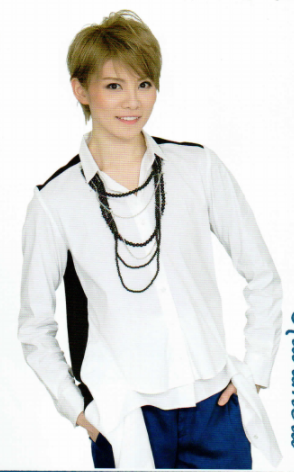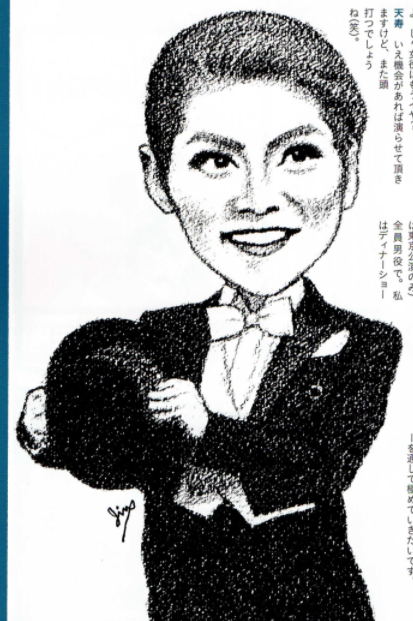This feature was originally published in the July 2016 issue of GRAPH.
Unlike many of Ashizawa’s columns, the format of this one is more conversational rather than being a question-and-answer style.
Mastery #6 – Ashizawa Jin interview with Tenju Mitsuki
Although I had a mental image of Tenju Mitsuki’s almond eyes with a sharp light, when the conversation got to the best parts, I was startled to notice how round her eyes had become. That’s an Akita beauty for you. I want to see Mikkii (Tenju) display completely the tenacity and determination those from rural areas need as she unwaveringly creates her own world.
Ashizawa: Tenju-san, though you are from Akita, you spend your childhood in Tokyo?
Tenju: That’s right. Because of my father’s employment, I was in Tokyo from age 3 until the end of elementary school.
Ashizawa: Then you must have seen Takarazuka perform in Toyko, and after returning to Akita you couldn’t forget the stage.

Tenju: That’s right. I passed the Takarazuka entrance exam on my second attempt; the first time, I just took vocals and ballet in Akita, but the second time I spent a week in Tokyo for a short intensive course during both winter and summer vacations.
Ashizawa: And even so, you entered as the top member of the 91st class, right? That’s amazing.
Tenju: No, no. While I was living in Tokyo I was totally focused on the arts. While I was taking jazz dance I was able to be in children’s musicals overseen by Nozawa Nachi, Ogura Kei, and others. During summer vacation we toured the whole country.
Ashizawa: Experiences like that must have spoken for you. And you would gain a lot of courage from that as well.
Tenju: But every time before the show my stomach would hurt (laughs). Though that still happens now (laughs). The day before the Sports Festival my stomach hurt so much I couldn’t even sleep (laughs). On the other hand I do have a daring side, so I’m at both extremes.
Ashizawa: I feel like I can understand now why, at the very start of your time in junior performances, you had several of veteran performer Suzumi Shio’s roles. Being chosen for difficult roles is the proof of real skill, after all.
Tenju: Not at all. First there was Ffoulkes in The Scarlet Pimpernel, then Albert in My dear New Orleans. Finally, the third role of hers that I performed was the Chief Elder in The Legend Version 2, but I was desperately trying to replicate every action Suzumi-san performed, and learn the lines, and learn the blocking, so I was really struggling to perform to the level of the main cast.
Ashizawa: You still hadn’t fully developed your own ‘otokoyaku’, and you couldn’t understand quite how to present yourself on the huge stage. That’s something you pick up little by little through watching the main cast.
Tenju: I’m small for an otokoyaku, so as a junior actress I still got a lot of roles in main cast, playing young boys. When I got to the point where I was given the role of a young man in a junior performance1 I was really happy to finally be playing a ‘man’, so I thought about ‘how can I look like a man’, and tried to figure out different things to do. I studied a lot to figure out how I could show myself as an otokoyaku despite my small size.
Ashizawa: The Top Star of Star Troupe at the time was Aran Kei, and while she is also on the small side she displayed incredible presence, right?
Tenju: Right. So I learned an incredible amount watching her.
Ashizawa: After that you had Kurenai Yuzuru’s roles of Sid in An Officer and a Gentleman, and Terry Benedict in Ocean’s 11. By the time you got to this point, you had created your own otokoyaku and were standing on your own two feet.
Tenju: With Sid, that was the first time I felt on stage like I couldn’t tell whether it was me or the character, so, while this might be a brazen thing to say, it felt like I really grasped that this is what it meant to act. Looking at the script, thinking myself that this is how the role out to be, and then living it on stage, I guess. But with Terry Benedict, in my last junior performance, I lost out mentally to the size of the role I was playing.
Ashizawa: That’s a really tough role. Acter all, you’re facing up to 11 opponents as only one person. You have to show an unshakeable presence.
Tenju: Kurenai-san was angry with me after the performance. “Couldn’t you have done more with that, Mikkii!? That was below my expectations!” she said (laughs).
Ashizawa: And you must have had those fears yourself.
Tenju: Right before my first entrance my feet froze in place. It was the first and only time I’ve ever experienced that. Though my stomach always hurts and my hands shake (laughs).
Ashizawa: You didn’t flesh out the role enough?
Tenju: That’s right. I couldn’t see the real essence of the role. I only grasped the size of the role and the outer nature, but I didn’t sufficiently analyze the role in my own way in order to bring it to life. I did notice that I had done that, but there wasn’t anything I could do about it. He’s an antagonist role, right. Somehow I had decided within myself that I couldn’t do that. Looking back on it, that is (laughs).
Ashizawa: But even just realizing that must have been a huge benefit.
Tenju: That’s right. Since I had so many regrets about the Grand Theatre [junior] performance, in Tokyo I put out everything I had, performing while thinking ‘I have to put enough into this that I feel like I could retire with this performance’, so at least personally I feel like I was able to graduate from junior performances sucessfully.
Ashizawa: Since Yuzuki Reon became the Top Star, you must have been able to learn many other, different things from her.
Tenju: At the start I was just staring at her like a fan, thinking “Wow~! She’s so cool!”, but as my year level went my responsibilities increased, so what I felt most is that I had to make sure I was dependable. There’s a mountain of things I learned from her, and being able to perform with someone as amazing as her, of course in dramatic scenes, but also just being able to dance behind her in the same scene, gave me so much to learn. Even though at the beginning we started in exactly the same situation with the same choreography, by the time we get on stage she could make it so much her own, and appeal to the audience so much, how is that—I spent the 6 years of Chie-san (Yuzuki’s) Top Star era thinking that the whooole time.
Ashizawa: And after Chie-san retired, her first performance was Prince of Broadway. What did you think of that?
Tenju: I had goosebumps all over, it was so incredible. Until just now we had been together, but it felt like she had gone somewhere I couldn’t possibly reach her. But watching her keep setting challenges for herself after retiring makes us incredibly proud, and it makes me feel that I have to keep working more and more to master my craft as an otokoyaku.
Ashizawa: It was great luck for you to encounter someone like that as you were coming into your own as an actor.
Tenju: I think it’s an amazing thing. Right now we’ve welcomed Hokushou-san, and Micchan-san (Hokushou) is also revealing a entirely different new world of her own, so I’m still just learning and enjoying it so much. I honestly feel like since this is the only now I have I have to absorb as much as I can, and though I’m pushing myself I’m still enjoying it somehow. Though I struggled, there’s lots of fun waiting beyond that, right. The more difficult the rehearsals are, the more fun the end performance will be, after all.
Ashizawa: In the 2014 National Tour Gone With the Wind, you played Belle Watling, an unusual role for you.
Tenju: It was my first time speaking in a female role, and my first time wearing a hoopskirt gown.
Ashizawa: It was quite the passionate performance, so it left a big impression with me.
Tenju: That role was a painful experience for me. Though there were people who said “You were good”, more than half said “That kind of Belle isn’t Belle at all!”. The real terror of revival performances, right.
Ashizawa: 10 different audience members will see you 10 different ways, so my opinion is that you shouldn’t pay them too much mind, and the most essential thing is how much you were able to put yourself into the role. So, are you sick of female roles now?
Tenju: No, if I had the opportunity I’d do it, but it might turn out to be a headache again (laughs).

Ashizawa: What aspect of yourself is something you’d be happy to have the creative staff incorporate?
Tenju: Oh~!? I wonder what… I play a lot of nice people, right. That’s probably the kind of image I have, but I get a lot of ‘soft’ roles. But in reality I’m super hard (laughs). Therefore I think it would be fun once in a while to play a villain or a character that’s rotten to the core.
Ashizawa: So that’s why you like Trigorin from The Seagull (laughs).
Tenju: Right, he’s the enemy of women. He seems really gentle but he has a rotten core (laughs). I’m probably not that earnest either. At the core (laughs).
Ashizawa: How was Kurenai Yuzuru’s dinner show STELLA ROSSA – Freedom and Random?
Tenju: It was fun. We were able to gather Kurenai 5 (Kurenai, Ichijo Azusa, Miya Rurika–Tokyo performances only, Kisaragi Ren, Tenju), and it was all otokoyaku. It was my third time being in a dinner show, and they come with a unique sense of nervousness. Before it starts you can directly hear all the sounds the audience is making all over the room. The sounds of utensils as they’re eating and such. And on our side there are only a few of us, so when we’re told “It’s starting!” there’s always a lot of nervousness.
Ashizawa: You also have the Takarazuka Paris Festival 2016 in July.
Tenju: Yes. I’m looking forward to it.
Ashizawa: What is it that you want to master as an actor right now?
Tenju: I want to be an otokoyaku who, once I’m onstage, can satisfy the audience with only a single line if I’m the one delivering it, and deepen the atmosphere of the show. Until even just recently, I showed my love for acting only on the outside, but it has to be the whole body, right. I want to master getting through plays and shows together.
1 – This seems likely to be Scott in the El Halcon junior performance.
